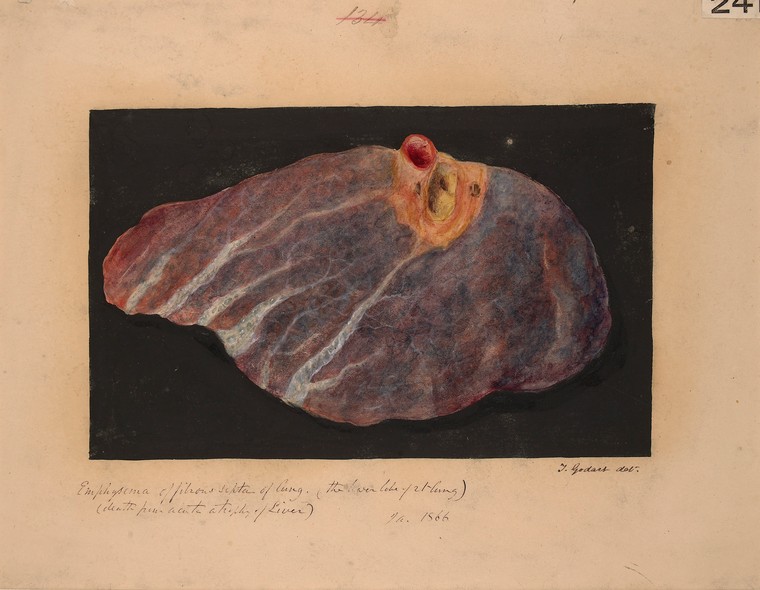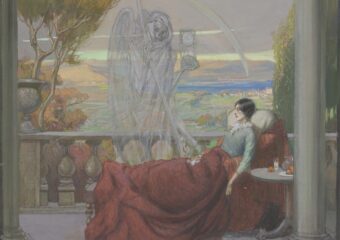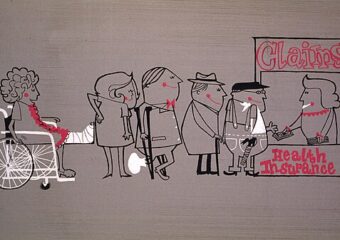Emphysema is a chronic lung condition that is classified under “chronic pulmonary obstructive disease” (COPD) along with chronic bronchitis. Smoking is a major cause of it. People with emphysema become increasingly short of breath as the disease progresses over time until doing very little or even nothing leaves them gasping for air. No cures exist and most treatments available can provide only some symptomatic relief. Emphysema is most often a drawn out and dreadful experience. Here, I compare a description of what people experience with emphysema from a classic biomedical text with a series of “notes” from a poet describing his experience with emphysema.
The Biomedical
From: Harrison’s Manual of Medicine, 20th edition, McGraw-Hill Education, New York, 2019
COPD is a progressive disorder; however, the rate of loss of lung function often slows markedly after smoking cessation occurs…Common symptoms of COPD patients include cough and phlegm production…Exertional dyspnea is a common and potentially disabling symptom in COPD patients. Exercise involving upper-body activity is especially difficult for severe COPD patients. Weight loss and cachexia are common in advanced disease…During times of COPD exacerbations, signs of respiratory distress may be prominent, including tachycardia, tachypnea, use of accessory muscles of respiration, and cyanosis.
pp. 741–742
The Sick Poet
From: Notes on Emphysema, Hayden Carruth, The Hudson Review 2001, Vol 53, no 4, pp. 584-592.
Hayden Carruth (1921–2008) was a poet, critic, novelist, and teacher. His poetry won him several awards. He suffered from emphysema, and made notes about the experience, which are shown below. Some people consider this collection of forty–eight, numbered notes as a poem, but they take more the form of pensées, and are comparable to the notes Alphonse Duadet produced about his pain and opium addiction.
Many of these notes individually, and when taken together, offer a much richer rendering of the illness experiences of emphysema than biomedical texts do.
1. Smudgie, my beautiful white cat, lies curled on the bed beside me. She doesn’t know she’s breathing
2. At the beginning of the instant of oxygen deprivation, as when one exhales as far as one strenuously can and the lungs ache, a diminutive twitch and tingle are felt in the little finger of each hand, as if it were a mild electric shock. The brain sends out its small distress signal. You had better pay attention.
3. Breathing is called an autonomic activity, and of course it is. Like the cat, a child doesn’t know it’s breathing. Yet sometimes in the duress you come to know too well you must concentrate every consciousness you have on one more breath.
4. Climb the stairs. Lie down. Stare at the water stain on the ceiling, at utter familiarity. Slow your heart and still the gasping. Gradually, gradually. Notice the rise and fall of your diaphragm, the diminishing pressure against your stomach. After five minutes take one deep breath. A great exhaustive sigh. Now, fall asleep.
5. The messy condensation inside the oxygen mask makes you think of a suckling infant. All that moistness on the brink of suffocation.
6. After walking up to the brush pile with a handful of winter twigs and small branches, do not catch your breath standing up. Fall to the ground. The grass. Turn on your back and cover your eyes with your arm. Open your mouth wide. Try not to choke.
7. When you increase your use of the medicated inhalers to three times a day, four times a day, commit yourself to the pain of knowing that this will not help you.
8. Commit yourself to pain.
9. Remember frequently what you have read, heard, and seen on film. The end will be a plasticine tent in a white room. Vague faces, unintelligible voices. The thump and rasp of the breathing machine, like a pile driver beside your head. A little fire of burning tinder in the bottom of your throat.
10. How alone can you get?
11. ‘Now I am dying. Now. I am afraid. Please give me a cigarette.
12. The x-ray shows nothing. A diseased alveolus looks the same as a healthy one. But the doctor can tell anyway, because the lungs grow grotesquely upward, squeezing into the collarbones, in order to get more air. The whole lungs, top to bottom, will no longer fit on an x-ray plate.
13. See the basketball player. Sprewell of the Knicks, for instance. Whirling like a tempest from one end of the court to the other and back again, never ceasing, and then the shots, the lay-ups, baseline jumpers, perimeter bombs, and the steals, the breakaways, dazzling, all magical and dazzling. But the really remarkable thing is how that man can breathe.
14. Learning to cough. Not the shallow, sharp spasm of earlier years. It must come from a deep place, as deep as you can get. Let it be slow, somewhat prolonged, yet very vigorous, a great huff, like blowing out many candles. Mouth wide open, trying not to wheeze. Bring up that awful, heavy clot of phlegm. Put it in a tissue. Examine it carefully for signs of blood.
15. The endless questions. Why do you smoke? Is it addiction to nicotine? Clearly not. What did nicotine ever do for you? Nothing, nothing at all. There is a difference, an important difference, between addiction and compulsion, no matter what the doctors and other innocents may think. Emphasize this. But where does the compulsion come from? From far in the back of the cave where the firelight doesn’t reach and you are a boy alone. And why is it so strong? That’s obvious. Because it saved your life.
16. Often of a summer evening one feels a chill, a shiver. Is it the dreaded virus? The virus which is nemesis for emphysema, especially when the emphysema is combined with chronic bronchitis, as it usually is. A touch of pneumonia can bring on the ultimate misery in no time. Ultimate, meaning what it means. Take aspirin, take whiskey. Go to bed, snuggle down, try to sleep in spite of a raging brain. Hope the chill is only an old man’s fragility. Hope for the best.
17. If you look in a mirror and see the lineaments of hope, smash the mirror. That’s what Paul said, long ago.
18. Is the emphysema more deranged than the other demons who have dwelt in one’s being from the start? Probably not. But it does have a material presence that the world can see. It has more power.
19. Good morning, emphysema. Good afternoon. Good night. Did you have a good day?
20. Remember what it meant to ‘take a walk’? Along the brook, through the hemlocks and spruces, around the bog, across the goldenrod and hardhack to the bank of fireweed, under the knoll where the purple-fringed orchis grew, wandering the hardwoods with the squirrels and ovenbirds scolding, up to the top of Marshall’s big rock? Breathing the clean air?
21. You can’t budge? Unh. Is it the emphysema? You bet. What does it do? Gives me the granddaddy of all depressions. What can I do? Give me a cigarette and go away.
22. Would you like something to drink? Thanks. I’ll have a little Kentucky cyanide.
23. First thing in the morning you can breathe—a little—and you can move—a little. It hurts. Five-thirty a.m. with gray light at the window, probably another day is beginning. Yeah. But man, like who gives a rat’s ass?
24. He would like to see his son, say a few words, hear his voice, touch him on the shoulder, he would like this more than any words could say any language. But the boy lives five hundred yards up the hill.
25. Choking and gasping in the night. The woman comes, the beloved. She who is constant, beautiful, and smart. But no one is smart enough to know what to do about this. Moments of overwhelming mutual disappointment.
26. When friends come you sit immobile, smiling, breathing quietly, the way the Buddha sat. But everyone is aware of the difference.
27. The Angelus. One doesn’t know what it means, being resolute in unchurchliness. But the word has such a pleasant sound. One would like to go to sleep by—at, on, with—the angelus. And perhaps never wake up.
28. After all, which means after a very great deal, perhaps a Catholic hospital would be best. He has never known a woman he could call sister.
29. When he is gasping and coughing, when arthritic pain rages in his back, shoulders, and hips, the dog does not understand. She will bring him her ball, the blue ball with a hole through it, and demand that they go out to play. Then she becomes visibly reproachful when he is unable to respond. He never knows whether to be sorry or pissed, and in fact he is both—at the same time uncomfortably pissed and sorry—for the dumb beast’s sake, for the man’s sake, and for the world’s.
30. What day is it? Monday, apparently. What date? The first of May. But it could be next Christmas, or possibly even the Christmas after that. The change of seasons is no more than a change of wallpaper now.
31. You reflect that emphysema affords one benefit after all. Your whole life you’ve suffered from acute acrophobia, sometimes dangerously. Jump, jump, the demon shouted, when you stood at the top of the precipice on Capri. But now you can’t climb high enough for the vertigo to set in. No doubt there are others.
32. When did one draw one’s last normal breath? Probably in sleep. When it did no good. Otherwise every breath, even in repose, is taken too quickly and expelled too forcibly, often through half pursed lips. As if you were trying to whistle long after you’d forgotten how.
33. What is a lung? Well, now that you ask, a lung is a sponge. And you know what happens to your kitchen sponge after you’ve used it a couple of years?
34. The computer doesn’t breathe, but sometimes it sighs. Especially when you turn if off.
35. ‘Get rid of the gasper. Why don’t you smoke one of those fine cigars from Philadelphia?’ ‘Why don’t you mind your own fucking business?’
36. The beginning. The ending. Inexorable. You used to think disacquiescence was a virtue that somehow lent dignity and integrity to human consciousness caught in the bind of essential injustice. Why not now? Well, that’s the kind of an idea one had during the middle.
37. You have two inhalers, called ‘puffers’ in the trade, which for two years you’ve been using as prescribed, two inhalations of each twice a day. You use an air chamber so that the maximum amount of medicine will reach your lungs. After each puff you hold the medicated mist in your lungs for thirty seconds if you can, though you probably can’t: in mid-case emphysema twenty seconds would be more realistic. Between puffs you exhale until you’re on the brink of fainting, in order to clear out as much of the smoke and stale air as possible. The whole process takes twelve minutes, morning and night, and produces no noticeable effect. On the other hand, if you neglect the puffers for a day you become aware of increased pain and greater shortness of breath. The strange thing is that even though this exercise is directly related to your hope of staying alive, it becomes a colossal bore. You have to flog yourself to it every morning and night. Is it that staying alive is something of a bore too? In addition you have a third puffer for use in emergencies, more powerful and with more evident side effects. You use it just before you dial ‘911.’
38. Ten times a day: ‘Why don’t you quit smoking?’ One has no hope of penetrating the so-called minds of these people. Talk about exclusion! Talk about discrimination!
39. He is a professional. He has read at least ten poems a day for sixty years—that’s 220,000 poems and probably a lot more. Not one of them was about breathing.
40. Do not hold your breath when doing something difficult, such as walking quietly in order not to disturb the sleeper or scraping the old inspection decal off your windshield. This seems to be a natural human practice, but it isn’t necessary and it only makes matters worse.
41. According to Victoria Maxx the Tletuecans had only one god, whose sole function was to take upon himself all the ills of the people. But it’s hard to imagine a divine person with emphysema.
42. Even so you relish what you still can do. You heave the bag of trash-paper—all those photocopied manuscripts, which weigh 100 pounds—into the back of your little station wagon, and then lean against the wall of the garage until you recover. Then you drive fifteen miles to the landfill, the recycling center, slowly through the beautiful tracts of woodland, accelerating to 75 through flat cornfields, to feel again the thrill of speed. And, you are immensely gratified by your own civic virtue. You drive with a calm heart and even breath.
43. Oh, to have a house with an elevator, two bathrooms, and a mechanical bed!
44. Your friend the psychiatrist told you that the reason you fall asleep so easily is because what you are doing is not interesting. Is it helpful to know that nothing is interesting? If only one could dream of interesting things! Instead, dream after dream, the same old inconsequential religious nonsense.
45. Caught in the irreversible, you do things that you absolutely KNOW are futile. Yet you do them. Again and again. To what a nonsense of misery the human spirit can be reduced!
46. Breath → Braeth, Old English for ‘odor,’ related to Greek atmos, ‘vapor.’ Not much help there. Latin spiritus, meaning both ‘breath’ and ‘spirit,’ whence ‘respiration,’ ‘aspiration,’ ‘inspiration,’ and of course ‘expiration.’
47. What does a square with a cross inside it mean? An expansive inner tension within an inflexible confining limit. In other words, breath.

48. In the computer it is call a wingding…

Also:
Title art: Interstitial Emphysema
Thomas Godart (active between 1852 and 1861)
Watercolor and ink drawing showing emphysema of the fibrous septa of a lung (interstitial emphysema). From a patient who died of atrophy of the liver.
Credit: St Bartholomew’s Hospital Archives & Museum. Attribution 4.0 International (CC BY 4.0)
Accessed through Wellcome Collection



